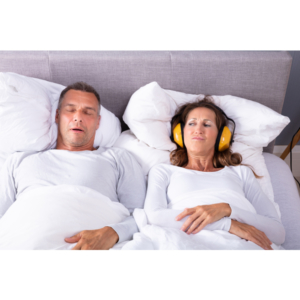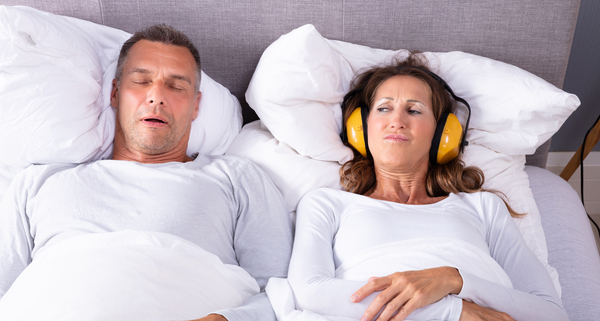Sleeping with a Motorcycle

Mature Woman Covering Her Ears With Headphone While Man Snoring In Bed
Many of our patients at our Smile Sarasota dental practice mention to Dr. Still that they may have a snoring problem and ask if he can help. Do you snore? If so, you’re in good company. The National Sleep Foundation estimates that 30 to 50 percent of the U.S. population snores at some point. To get relief, many patients talk to their primary care physician. But did you know that you can also talk to Dr. Still? You may not know that your dentist is often the earliest professionals to diagnose sleep disorders.
Snoring occurs when there is an obstruction in your airway during sleep. The American Dental Association explains that this obstruction can be caused by the tongue or soft tissues in the mouth. When tissues in the top of the airway hit each other, the vibration that results creates a loud noise. The loud noise may occur with short pauses in between. This could be an indicator of sleep apnea. When a patient has obstructive sleep apnea, breathing actually stops for brief moments, and this process can result in damaging effects on the body, such as atherosclerosis and other serious cardiovascular problems. Sleep apnea and the tendency to snore at night can also be the cause of daytime sleepiness and daily fatigue. We will discuss this in a future Smile Sarasota Blog.
So how can Dr. Still help me? If you or your partner notices an on-going problem at night, tell Dr. Still. There are several tests that he can arrange to diagnose the issue. One of these tests is called a “sleep study”. He will refer to to a sleep specialist and during the evaluation, your sleeping patterns will be analyzed and your vital signs are monitored over the course of a night.
But there are other remedies Dr. Still may suggest first. The National Institutes of Health and the National Institute on Aging recommend these strategies to reduce snoring at night:
- Lose weight. Too much weight can cause changes to the structures around your airway.
- Consume little or no alcohol at night. Alcohol can change the quality of your sleep.
- Reduce or eliminate the use of sedatives. Talk to your doctor about alternatives.
- Don’t sleep on your back. Try side sleeping with a supportive pillow.
With the support of Dr. Still at Smile Sarasota, you should be able to get to the root of your snoring issue and sleep more soundly at night. Even if a dental issue isn’t the cause of snoring, snoring can result in dry mouth. As snore sufferers are trying to breathe, the mouth is also struggling to produce enough saliva. Dry mouth can accelerate tooth decay, mouth sores, bad breath, and gum disease. Contact Smile Sarasota if you are concerned about snoring – we can help!
Sources and Credits: Colgate.com, The National Sleep Foundation, The American Dental Association, WebMD, The National Institutes of Health, The National Institute on Aging




